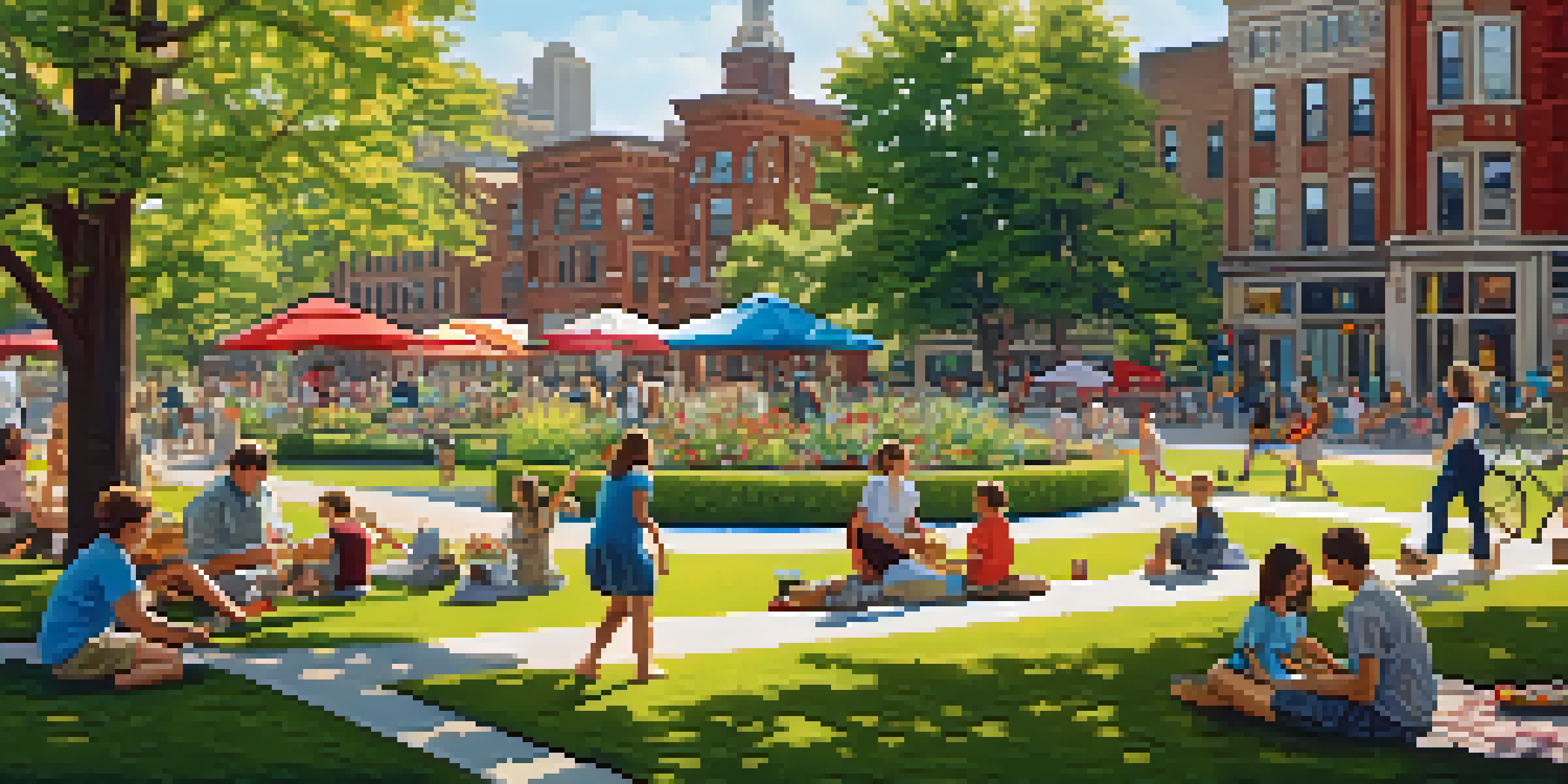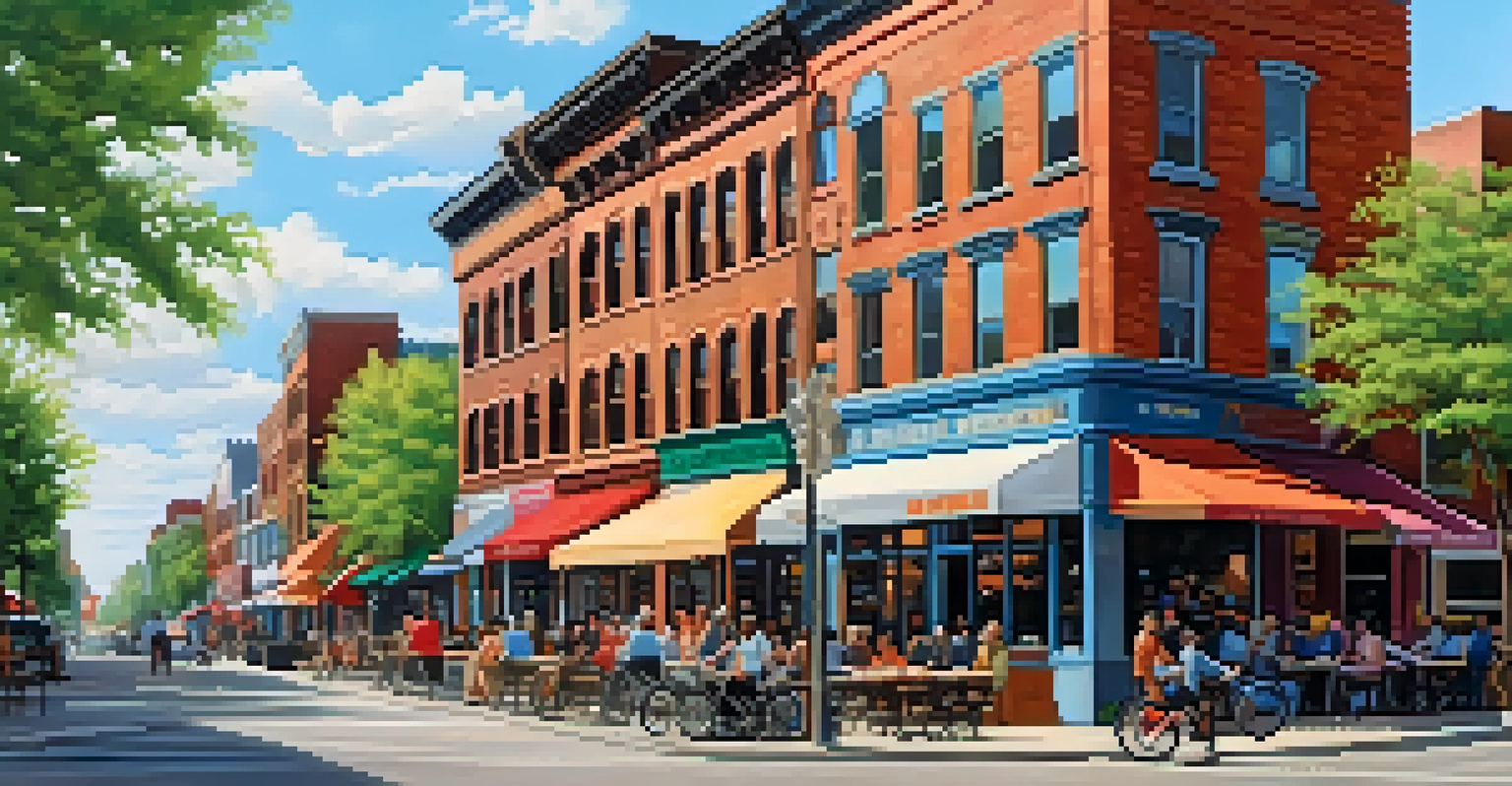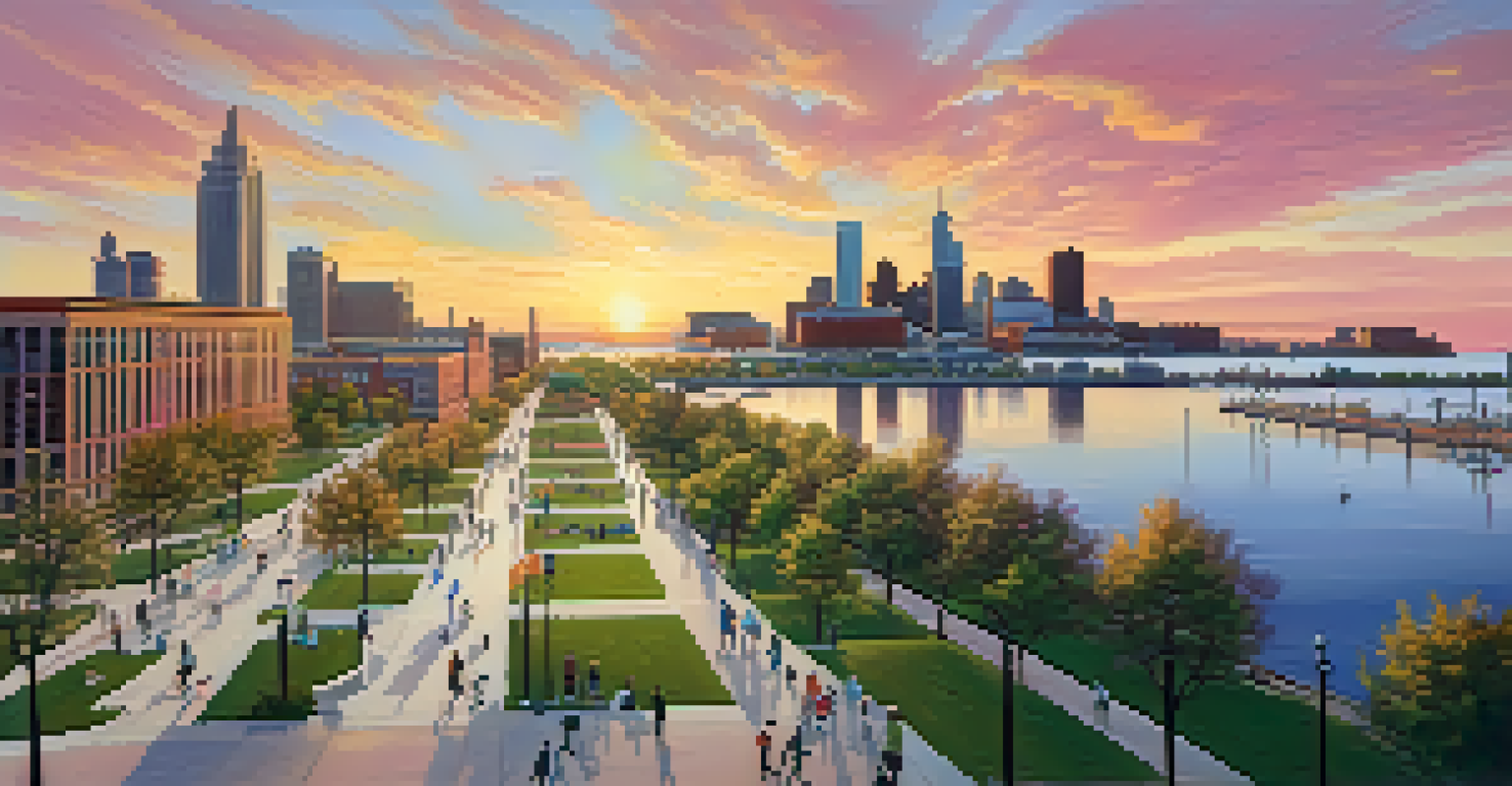Long-Term Economic Impact of Urban Renewal in Detroit

Understanding Urban Renewal in Detroit's Context
Urban renewal in Detroit refers to the process of revitalizing neighborhoods that have suffered from disinvestment and decay. Initiatives began in the mid-20th century, aiming to address issues like housing shortages and economic decline. This urban transformation involves not just physical infrastructure improvements, but also social and economic revitalization efforts.
Cities are not just places to live; they are places to thrive. Urban renewal is about creating environments where communities can flourish.
As the city faced significant challenges, such as population decline and job loss, urban renewal efforts sought to attract businesses and residents back to the area. These projects often included the renovation of historic buildings and the development of new amenities. By creating a more appealing environment, the hope was to breathe new life into the city's economy.
However, urban renewal isn’t just about shiny new buildings; it’s about fostering a sense of community and belonging. While revitalization can lead to increased property values and economic activity, it must also consider the existing residents and their needs. Striking this balance is crucial for long-term success.
The Economic Boost from Urban Renewal Projects
One of the most significant impacts of urban renewal in Detroit has been the economic boost it provides. New businesses and investments not only create jobs but also stimulate local economies. For example, the revitalization of neighborhoods like Corktown has attracted restaurants, shops, and cultural venues, which in turn generate tax revenue for the city.

Moreover, urban renewal often leads to increased property values, benefiting homeowners and creating a more vibrant tax base. This influx of capital allows the city to reinvest in public services, such as education and infrastructure. As neighborhoods become more desirable, they can also attract larger companies, further enhancing job opportunities.
Urban Renewal Boosts Local Economy
Revitalization projects in Detroit create jobs and stimulate economic growth by attracting new businesses and increasing property values.
However, it’s essential to approach these projects with an eye toward sustainability. Economic growth should not come at the expense of the community’s original character or the displacement of long-term residents. Ensuring that growth is inclusive is key to the overall health of Detroit’s economy.
Job Creation and Workforce Development Initiatives
Urban renewal projects in Detroit have led to a significant increase in job creation, particularly in construction and related industries. As new buildings rise and neighborhoods are rejuvenated, there is a growing demand for skilled workers. This demand offers a great opportunity for local residents to gain employment and develop new skills.
Revitalizing a city is not just about buildings; it's about the people who inhabit them and the opportunities they are afforded.
In addition to direct job creation, these initiatives often pave the way for workforce development programs aimed at enhancing employability. Partnerships with local educational institutions and training organizations can help residents acquire the skills needed for new job opportunities. As a result, urban renewal not only addresses immediate economic needs but also invests in the future workforce of Detroit.
However, it’s crucial that these workforce initiatives are accessible to all community members, especially those who have been historically marginalized. By focusing on inclusive job training and hiring practices, urban renewal can help lift entire neighborhoods out of poverty and create a more equitable economy.
Revitalizing Public Spaces and Their Economic Impact
Public spaces play a vital role in urban renewal, enhancing community engagement and attracting visitors. Parks, plazas, and recreational areas not only beautify neighborhoods but also serve as gathering spots for residents and tourists alike. The revitalization of Detroit’s waterfront, for example, has drawn significant foot traffic and stimulated nearby businesses.
These public spaces can also host events and activities that foster community spirit while generating economic activity. Farmers markets, festivals, and outdoor concerts can bring people together and encourage them to explore local shops and restaurants. As a result, investing in public spaces can yield substantial economic returns for the city.
Focus on Community Inclusivity
Successful urban renewal must prioritize the needs of existing residents to prevent displacement and ensure equitable development.
Moreover, well-maintained public spaces contribute to improved quality of life, making neighborhoods more attractive for potential residents and businesses. A thriving public realm signals a vibrant community, which can lead to increased investment and further economic growth.
Challenges Facing Urban Renewal Efforts
While urban renewal in Detroit has brought about positive changes, it is not without its challenges. One major concern is the risk of gentrification, where rising property values may displace long-time residents. As new developments attract wealthier individuals, the original community members often find it difficult to afford housing.
Additionally, there can be a disconnect between urban planners and the needs of the local community. If renewal projects prioritize aesthetics over the needs of existing residents, they may fail to foster genuine economic growth. Engaging the community throughout the planning process is essential to ensure that everyone benefits from the changes.
Financial limitations can also hinder the effectiveness of urban renewal efforts. Insufficient funding or misallocated resources can stall projects and limit their impact. Addressing these challenges requires a collaborative approach that involves community input, sound financial planning, and a commitment to long-term sustainability.
Long-Term Sustainability and Economic Resilience
For urban renewal in Detroit to be truly successful, it must prioritize long-term sustainability. This means not only addressing immediate economic needs but also considering the environmental and social impacts of development. Sustainable practices can ensure that the benefits of renewal are felt for generations to come.
Moreover, economic resilience is key to weathering future challenges, such as economic downturns or shifts in industry. By diversifying the local economy and investing in various sectors, Detroit can better withstand fluctuations and maintain stability. Supporting local businesses and encouraging entrepreneurship can also contribute to a more resilient economic landscape.
Sustainability Ensures Long-Term Success
For lasting impact, urban renewal efforts must integrate sustainable practices that benefit both the economy and the environment.
Ultimately, a focus on sustainability and resilience will not only enhance the city's economy but also improve the quality of life for its residents. By fostering an inclusive, vibrant community, Detroit can ensure that urban renewal leads to lasting benefits for all.
The Future of Detroit: Urban Renewal's Legacy
As we look to the future, the legacy of urban renewal in Detroit will continue to shape the city's economic landscape. The successes and challenges of past initiatives provide valuable lessons for future projects. By learning from these experiences, city planners and community leaders can create more effective strategies that prioritize inclusivity and sustainability.
Moreover, the ongoing commitment to urban renewal will be essential in attracting new residents and businesses to Detroit. As the city evolves, it must remain adaptable to changing economic conditions and community needs. This flexibility will ensure that Detroit remains a vibrant and thriving urban center.

In conclusion, the long-term economic impact of urban renewal in Detroit is multifaceted. It encompasses job creation, community engagement, and sustainable development, all of which are vital for the city’s future prosperity. By continuing to invest in urban renewal with a focus on inclusivity, Detroit can build a brighter tomorrow for all its residents.